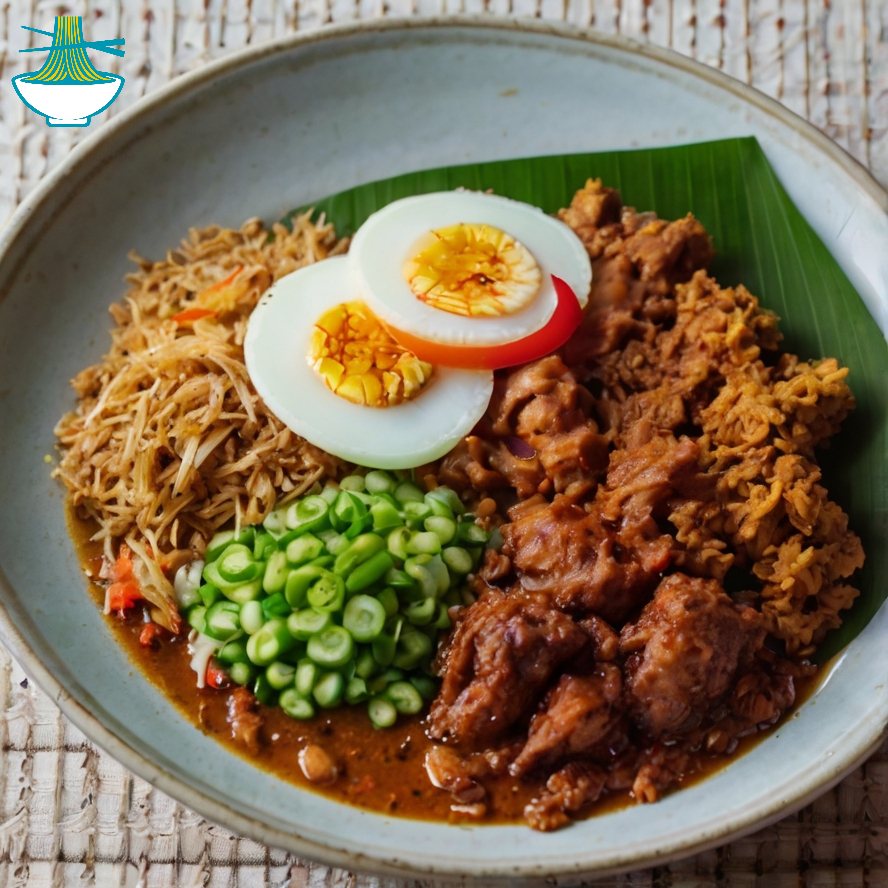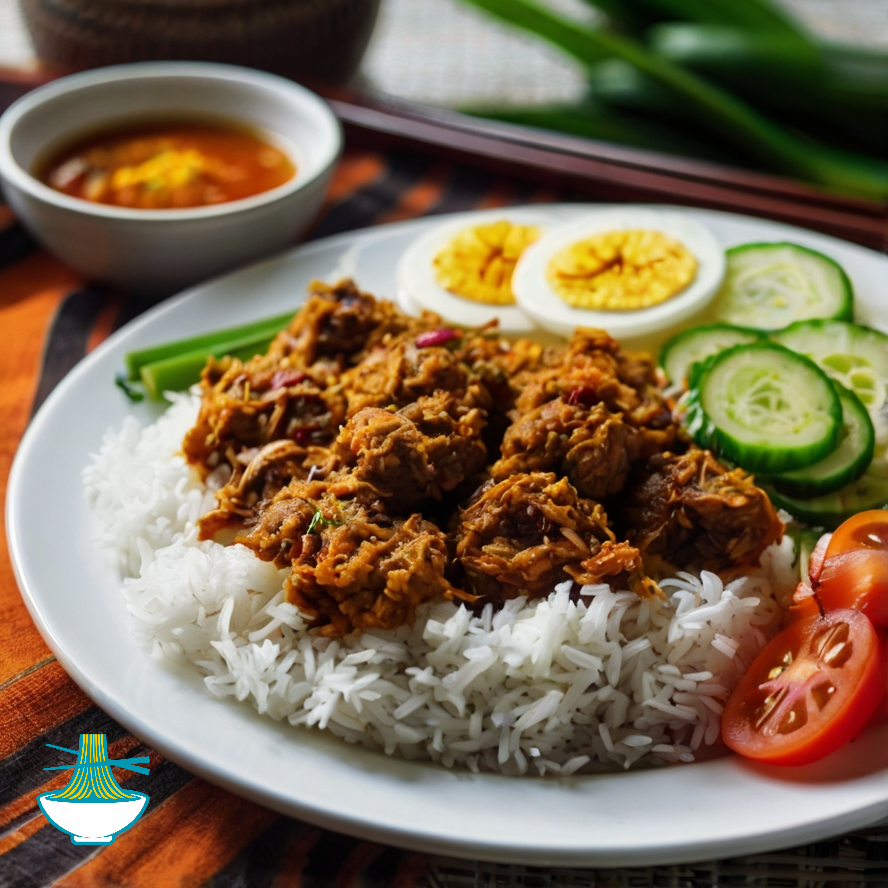Indulge in the rich flavors of Indonesia with Nasi Uduk, a traditional Betawi-style steamed rice dish cooked in creamy coconut milk. Originally from Jakarta, this fragrant rice is served with an array of delicious side dishes, including crispy fried chicken, savory perkedel (potato fritters), fluffy shredded omelette, crispy tempeh, and spicy sambal. Experience the authentic taste of Indonesia with every bite of this satisfying and aromatic meal.
Here's a recipe for Nasi Uduk, a Betawi-style steamed rice dish cooked in coconut milk, served with various side dishes:
Ingredients:
- 2 cups jasmine rice
- 1 3/4 cups coconut milk
- 1 1/4 cups water
- 1 pandan leaf, knotted (optional)
- 1 teaspoon salt
- 1 teaspoon sugar
For the side dishes:
- Fried chicken pieces
- Perkedel (potato fritters)
- Shredded omelette
- Tempeh, sliced and fried
- Sambal (spicy chili paste)
Instructions:
1- Rinse the rice until the water runs clear. Drain well.
2- In a large pot, combine the rice, coconut milk, water, pandan leaf, salt, and sugar.
3- Bring to a boil over medium-high heat, then reduce the heat to low. Cover and simmer for 15-20 minutes, or until the rice is cooked and the liquid is absorbed.
4- Remove the pot from the heat and let it sit, covered, for another 5-10 minutes.
5- Fluff the rice with a fork before serving.
6- Serve the Nasi Uduk with the side dishes: fried chicken, perkedel, shredded omelette, tempeh, and sambal.
Enjoy your flavorful Indonesian meal!
Nutritional Values :
Here are the approximate nutritional values for the main ingredients in the Nasi Uduk recipe per serving:
Jasmine Rice (2 cups)
- Calories:1,200 kcal
- Fat: 2g
- Carbohydrates: 260g
- Protein:20g
Benefits: Jasmine rice is a fragrant long-grain rice that provides energy and is easy to digest. It's also low in fat.
Coconut Milk (1 3/4 cups):
- Calories: 750 kcal
- Fat: 75g (mostly saturated fat)
- Carbohydrates: 16g
- Protein: 8g
Benefits: Coconut milk adds a rich flavor and creaminess to the rice. It provides MCTs, which are beneficial for quick energy and may support weight management.
Water (1 1/4 cups):
- Calories: 0 kcal
- Fat: 0g
- Carbohydrates:** 0g
- Protein: 0g
Benefits: Water is essential for cooking rice and hydrating the body.
Pandan Leaf (optional, 1 knotted leaf):
- Calories: Negligible
- Fat: 0g
- Carbohydrates: 0g
- Protein: 0g
Benefits: Pandan leaf is used for its aromatic flavor and has antioxidant properties. It’s often used in Southeast Asian cuisine to enhance the flavor of rice dishes.
Salt (1 teaspoon):
- Calories: 0 kcal
- Fat: 0g
- Carbohydrates: 0g
- Protein: 0g
Benefits: Essential for balancing flavors, salt is also important for maintaining electrolyte balance in the body.
Sugar (1 teaspoon):
- Calories:16 kcal
- Fat: 0g
- Carbohydrates: 4g
- Protein: 0g
Benefits: Adds a slight sweetness to balance the savory flavors in the rice.
For the Side Dishes:
Fried Chicken Pieces:
- Calories:Varies depending on the portion size and cooking method, approximately 300-500 kcal per serving
- Fat:20-30g
- Carbohydrates:0-15g (depending on the coating)
- Protein:25-35g
Benefits: Provides a good source of protein, essential for muscle repair and growth. However, fried chicken is high in fat and should be consumed in moderation.
Perkedel (Potato Fritters):
- Calories: 200-300 kcal per serving
- Fat: 10-15g
- Carbohydrates: 25-35g
- Protein: 5-8g
Benefits: Perkedel adds texture and flavor, and potatoes provide carbohydrates for energy. These fritters are also a source of vitamins B6 and C.
Shredded Omelette:
- Calories:150-200 kcal per serving
- Fat:10-15g
- Carbohydrates: 1g
- Protein:12-15g
Benefits: Eggs are an excellent source of protein, vitamins, and minerals, particularly vitamin D, B12, and choline, which are important for brain health.
Tempeh, Sliced and Fried:
- Calories:150-200 kcal per serving
- Fat:10-15g
- Carbohydrates:10-15g
- Protein:15-20g
Benefits: Tempeh is a rich source of plant-based protein and is high in probiotics, which support gut health. It also contains iron, calcium, and magnesium.
Sambal (Spicy Chili Paste):
- Calories:50 kcal per tablespoon
- Fat: 3g
- Carbohydrates: 6g
- Protein: 1g
Benefits: Sambal adds heat and flavor to the dish and is rich in capsaicin, which can boost metabolism and improve digestion.
These values are approximate and can vary based on specific brands, preparation methods, and serving sizes.


Comments